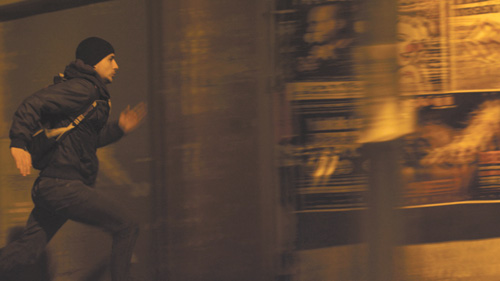Out in the Dark
Opening in Sebastopol’s Rialto Cinemas on October 11, “Out in the Dark” is an LGBT-award-winning Israeli import where its name describes the movie in both literal and figurative ways. The curtain opens with a young man scrabbling his way through an ill-lit border crossing to enter a nightclub where the slinky dress on the singer and the shiny beer taps behind the bar are almost the only things visible in the dark interior. For some inexplicable reason, the main source of conflict in this dank place is that the bartender ignores the newcomer’s requests for a drink. When another guy offers to help, he doesn’t fare much better, finally receiving an “in a minute” acknowledgment from the bar keep.
An astute audience (or someone who has read the movie posters) will understand that the opening scenes contain a series of clues about the not-so-well-kept secrets fueling the banked fires which inevitably flare-up in this film.
The first secret is that the border-crossing, Palestinian psychology student, Namir (Nicholas Jacob), is gay. He stays in the closet for a very good reason—for if his family finds out they will shun him, he will lose his chance to attend the university in Tel Aviv, and a scholarship to Stanford.
The second secret is that Roy (Michael Aloni), the unattached guy at the bar, is a gay Israeli lawyer who lives a semi-closeted life with only his immediate family knowing “the truth.”
The third secret is that Namir’s older brother Nabil (Jameel Khouri) is a militant Palestinian warrior with a secret cache of weapons, and a belief-fueled desire to kill all Jews and homosexuals—including (when secret No. 1 is revealed) his own brother.
The initial meeting at the bar telegraphs the eventual relationship between Namir and Roy, who, in the sexual privacy of their own bedroom, are willing to forget what is happening in the world on the other side of the closed door.
But no door is built strong enough. For suspicion based on generations of fear, distrust and manipulation of “truthiness” by all sides (and there are many more than two sides here) quickly re-casts the lovers into victimized stooges, with the other characters acting out clichéd, scripted parts.
The audience knows that this is just melodramatic fiction, and we are left with mixed emotions about Nabil and Roy. Are we supposed to like them because just because they are gay, or because they react to taunts from drunk passers-by with threats of violence? Do we believe that Namir wants anything more from Roy than to wallow in his luxurious lifestyle and use his lawyer friend to help him escape to freedom in another, less paranoid part of the world?
Stark contrast is provided by two recent Israeli documentaries mirroring this drama’s scripted narrative with real-life events. The first film is “The Invisible Men,” the astounding tale of three Palestinian men that director/producer Yriv Mozer brought to this year’s Sebastopol Documentary Film Festival: Louis, who lives in constant fear of arrest and deportation—forced to take jobs that pay a substandard hourly wage and camp on the rooftops of abandoned buildings. His only respite is the underground gay nightclub that moves its secret location from week to week; Faris, who heads to Tel Aviv to escape his murderously homophobic family, and Abdu, tortured by Palestinian security forces because his sexuality became public knowledge.
The other documentary is “The Gatekeepers,” Dror Moreh’s riveting conversations with the six former leaders of Shin Bet, the Israeli Intelligence Service. With amazing candor, these six men detail the reality of trying to contain violence in the occupied Palestinian territories while their politician bosses change directions like windmills. “We didn’t know what we wanted to do there,” says one man. “There was no strategy to it at all,” says another, “just tactics.” And underlying everything is the single-minded intransigence of Israel’s religious right—zealots with political power. “I understand why [the Palestinians] fight,” one former intelligence chief says in summary. “I would too … one man’s terrorist is another man’s freedom fighter.”
In short, the documented reality of “The Invisible Men” and “The Gatekeepers” trump the well-intentioned fiction of “Out In the Dark.”
Comments? E-mail gi*********@*****st.net.









